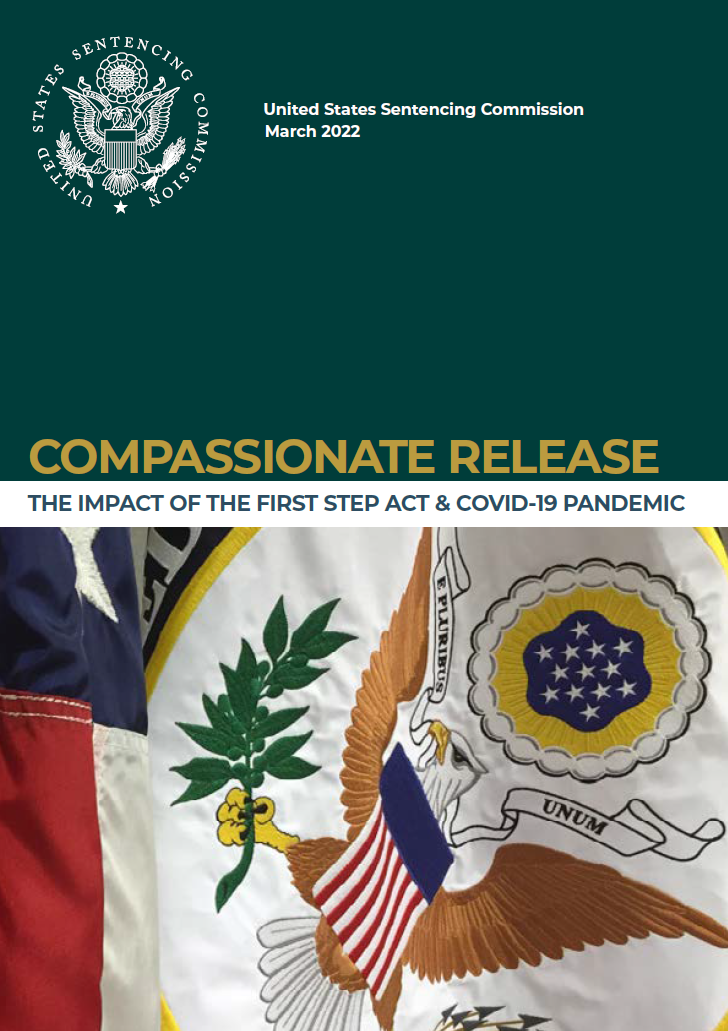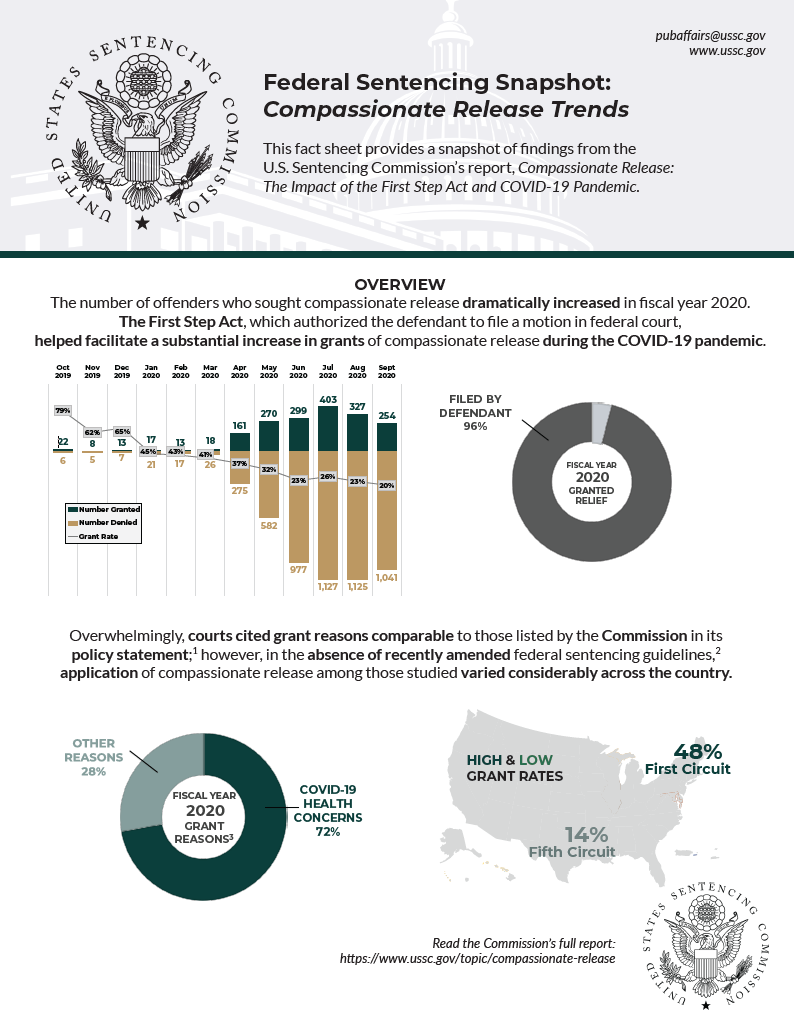Compassionate Release: The Impact of the First Step Act and COVID-19 Pandemic
(Published March 10, 2022) This publication describes trends in compassionate release decisions during fiscal year 2020, focusing on the continuing impact of the First Step Act of 2018 and the more recent and dramatic impact of the COVID-19 pandemic. It includes detailed information about the reasons courts cited to grant or deny section 3582(c)(1)(A) motions and, for offenders granted a sentence reduction, the nature of the relief received.
This report first provides an overview of offenders who were granted or denied compassionate release in fiscal year 2020, examining geography, demographics, offense type, criminal history, and selected offense characteristics. Next, it focuses on offenders granted compassionate release, describing the reasons courts cited for granting relief and the nature of the relief received. Finally, it focuses on offenders denied relief in fiscal year 2020, describing the reasons courts cited for denying relief. Where appropriate, this report also highlights similarities and differences with the data in the Commission’s First Step Act Year One Report and with the composition of the federal prison population.
The overwhelming majority of compassionate release decisions studied in this report occurred during the second half of the fiscal year, after the onset of the pandemic. As a result, this report largely focuses on the early response to the COVID-19 pandemic and is not reflective of later trends in compassionate release, once COVID-19 vaccines became widely available, or predictive of future trends.


Key Findings
Building on the First Step Act Year One Report and Compassionate Release Data Report, this report examines the use of compassionate release during fiscal year 2020. As part of this analysis, the Commission makes the following key findings:
- Both the number of offenders who sought and the number of offenders who were granted compassionate release dramatically increased in fiscal year 2020, primarily in response to the COVID-19 pandemic.
- In fiscal year 2020, courts decided an 18 U.S.C. § 3582(c)(1)(A) motion for 7,014 offenders and granted a sentence reduction to 1,805 offenders (25.7%). The number of Offenders Granted Relief increased more than twelvefold from First Step Year One (145 offenders).
- Most grants of compassionate release (95.0%) occurred during the second half of the fiscal year, as COVID-19 became widespread. Only 5.0 percent (n=91) of compassionate release grants occurred during the first half of the fiscal year.
- The number of Offenders Granted Relief increased each month between February and July 2020 (to a high of 403 Offenders Granted Relief) and then decreased during the final two months of the fiscal year (to 327 in August and 254 in September 2020).
- In fiscal year 2020, 96.0 percent of Offenders Granted Relief filed their own motion.
- Courts cited the health risks associated with COVID-19 as at least one reason for granting relief for 71.5 percent of Offenders Granted Relief.
- Courts cited a reason specifically described in the policy statement or another comparable reason other than COVID-19 as at least one reason for granting relief for nearly 20 percent of Offenders Granted Relief.
- The likelihood that an offender would receive compassionate release substantially varied by circuit, from a grant-rate high of 47.5 percent in the First Circuit to a low of 13.7 percent in the Fifth Circuit.
- In fiscal year 2020, courts cited a reason related to length of the offender’s sentence to support a grant for a small percentage (3.2%) of Offenders Granted Relief. Courts disagreed, however, about whether such reasons can present a legally permissible basis for granting relief under section 3582(c)(1)(A).
- Although older offenders represented a small portion of offenders who sought compassionate release, they were more likely to be granted relief compared to younger offenders. The grant rate was highest (61.5%) for offenders 75 years or older and lowest (below 20%) for offenders under 45 years old.
- With the exception of offenders who received original sentences of 240 months or longer, as the length of the offender’s original sentence increased, the likelihood that the court would grant relief decreased (from 56.9% of offenders sentenced to a term of 12 months or less to 19.8% of offenders sentenced to a term of between 120 and 240 months). The grant rate for offenders who received an original sentence of 240 months or longer was 29.9 percent.
- Offenders Granted Relief had served an average of 80 months and 50.5 percent of their sentence, while Offenders Denied Relief had served an average of only 57 months and 39.0 percent of their sentence.
- Across racial groups, the grant rate varied by only 2.2 percentage points (from a high of 27.5% for Other race offenders to a low of 25.3% for White offenders).
- The grant rate varied by no more than 5.3 percentage points between offenders with the highest grant rate, in Criminal History Category (CHC) II (27.6%), and the lowest grant rate, in CHC III (22.3%).
- The grant rate varied by no more than 5.2 percentage points across the most common offense types, from a high of 28.8 percent for fraud offenders to a low of 23.6 percent for firearms offenders.
- Although they represented a small percentage of offenders who sought relief, the grant rates were generally much lower for offenders who were convicted of violent offenses.
- In fiscal year 2020, the average reduction in sentence for Offenders Granted Relief was nearly five years (59 months) and more than 40 percent (42.6%) of the offender’s sentence.
- Courts granted somewhat longer reductions in sentence to offenders who were granted relief for reasons related to the Commission’s policy statement other than COVID-19 (65 months and 44.0% of sentence) than to Offenders Granted Relief based specifically on the risk of contracting COVID-19 (54 months and 41.7% of sentence).
- The relatively small group of Offenders Granted Relief based on a sentence-related reason received an average reduction of 235 months, nearly four times longer than the reductions for Offenders Granted Relief overall.


